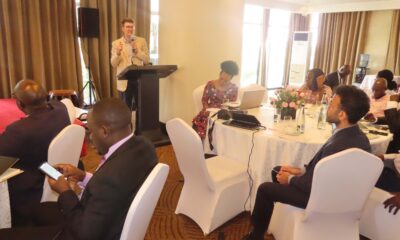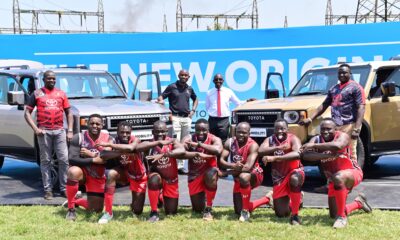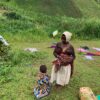Business
Hope After COVID19, Resilience in Business
Written by Wabomba Joseph Martin
In 2020, the government of Uganda instituted a country-wide lockdown in a bid to contain the spread of coronavirus. This led to the closure of businesses, limited employment spaces, and limited transport and movements of people across different locations. This later shaped a challenging atmosphere where some people took it as an opportunity to leverage the business spaces in order to support their households through the provision of food, water, electricity, Medical care, and shelter as the basic needs.
Now, mercy Agwang, 25, years from Obutuwelo village, lira city, in northern Uganda says that life was not so difficult until Covid -19 set in. She recounts how the beginning was tough for both her and her family as she lost her job as a bar attendant and embarked on the entrepreneurial journey.
Bars were some of the public spaces that were restricted throughout the entire time the pandemic was pronounced, rendering her jobless.
Agwang, a single mother of four was abandoned by her husband during the lockdown, prompting her to think of a business idea to put food on the table for the family.
“I quickly envisioned the face mask selling business venture since at that time face masks were a mandatory requirement as a measure to contain the spread of coronavirus announced by the government,” Agwang recalls.
Agwang says after hatching the idea, she straight up laid out a plan on how to acquire skill sets for making the facemasks, market survey research, and identifying people with the sewing machines for hire since she did not have enough capital to purchase her own, and therefore, she maximized the opportunity and began to produce face masks.
“I started out with a capital of 100,000shs that I had saved from my previous bar attendant job, bought materials worth 50,000shs, hired the machine for a month at 20,000shs and started production of face masks,” she recollected.
Agwang says that at the inception of the business, she faced a lot of challenges ranging from gaining expertise in the business since she was new in the field and was limited with sewing skills, to finding a market for the finished product was very aching as she sometimes took to door to door and referral systems since at that time quite many people had entered the same business arena hence competition set it.
Day–by–day Agwang remembers amidst the numerous challenges she encountered, she was able to teach herself extra hours through practising new sewing skills and improved her customer care skills and communication skills hence competing favourably with other entrepreneurs.
She, also notes that since face masks were a lucrative business, she learned how to mitigate losses while maximizing profits. This she says was through producing quality face masks, well-columned and fitting which prompted an attraction of customers hence masking more profit.
Agwang, remembers that on her normal daily sales would earn 10,000shs as profit from the face masks produced per day of between 10-20 pieces. As she continued building resilience, she was able to actualize the business by acquiring skills from the experiences in her job.
A single mother, Agwang says that not only was she witnessing success in her business, but that her standard of living improved. She could afford to feed the family with or without a husband, and gained hope of taking back her children to school since at that time schools were also one of the sectors closed by the government as a measure to contain the spread of coronavirus.
Agwang says she later came up with the idea of training more women that shared the same challenge and beyond to help them appreciate the use of different skill sets in a business idea so they could fend for themselves as most of the women were left with the responsibilities of feeding the children while their husbands are out drinking alcohol.
She began to talk to a few of the women groups in her community and they appreciated the idea, welcomed it and off they started different business skills training.
Agwang, who started with only 10 women that were interested in learning different skills currently has a team of 100 women.
“I remember I began with 10 women in my community we had no name of the group, but after the 10 members, we were able to get a name of the group called “Obutuwelo skills training school” the number of women increased to 100 members through a referral system,” Agwang says.
She notes that a little business idea that started out as thought was now transforming her community through skills empowering especially women to learn how to fend for their families in the event they lost jobs as a result of covid -19.
However, Agwang’s worries and fears started setting in when the covid-19 reduced and the economy was fully reopened.
With a reduction in the demand for masks, she is now being set back to search for another job for survival. This now puts her at the stake of providing for her family and supporting the community through her masks project that attracted many women into mindset change from being employed to self-employed.
This publication was produced with the financial support of the European Union. Its contents are the sole responsibility of Wabomba Joseph and do not necessarily reflect the views of the European Union












































